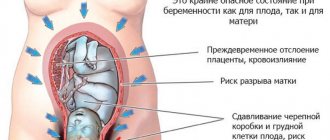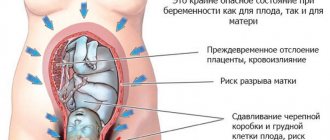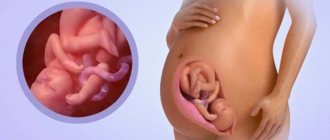The sensations of a pregnant woman at 5 weeks of gestation can be varied. Some expectant mothers practically do not feel their special situation and generally lead the same lifestyle as before pregnancy, but with some restrictions. Other women experience early toxicosis and other types of discomfort. If the lower abdomen feels tight, for example, this is not always considered an unfavorable symptom. In any case, you need to report any unpleasant sensations to your gynecologist.
Pain in the early stages
If the lower abdomen pulls during pregnancy (5 weeks), in most cases the reasons are physiological. This symptom is noted by about half of women expecting a child. Minor discomfort is associated with gradual stretching of the muscles and ligaments. A quarter of patients during pregnancy at 5 weeks have pain in the lower abdomen due to pathology. This may indicate a threatened miscarriage or an ectopic pregnancy. In any case, if discomfort occurs (especially if it is accompanied by other alarming symptoms, for example, bleeding from the genital tract), you should consult a gynecologist. An ambulance should be called in case of heavy bleeding from the genital tract, intense pain or a sharp deterioration in health.
Examinations, tests
At 5 weeks, women who have had unprotected sexual intercourse may notice irregularities in the timing of menstruation. Such sensations are especially pronounced in women who have had a regular cycle.
What the test will show
If all conditions are strictly followed, home tests can show pregnancy in the first few days after menstruation does not occur. But if ovulation and conception occurred according to a different scenario (with a shift in the schedule), then the test results will be negative - the level of human chorionic gonadotropin in the urine is still too low.
Home tests look at the level of hCG in the urine. A more sensitive test option is blood testing.
Examination by a gynecologist
Sometimes pregnancy in the fifth week can be detected during an examination by a gynecologist. The symptoms that an experienced doctor can detect relate mainly to the condition of the uterus. If a fertilized egg is “planted” in this organ, it will change its shape to round, as well as its size - the hormones produced by the body thicken the muscle layer, making the uterus larger.
Causes of the symptom
The lower abdomen hurts during pregnancy at 4-5 weeks for physiological or pathological reasons. In the first case, discomfort is associated with an enlarged organ. The ligaments and muscles supporting the uterus are stretched, which is accompanied by minor discomfort: aching and tingling in the lower abdomen. Pregnancy in the 5th week and later is accompanied by various physiological sensations. In the future, the uterus will continue to grow and begin to put pressure on nearby organs, and in the third trimester the body will prepare for labor.
At the 5th obstetric week of pregnancy, the lower abdomen pulls for various reasons, which pose a danger to the woman’s health and the life of the fetus. In order to accurately diagnose and maintain pregnancy, you need to contact a district or private gynecologist, or the nearest gynecology department. Increased tone of the uterus, cessation of development (fading) of the fetus, inflammatory processes of internal organs, abnormal development of the reproductive system, and infectious diseases can be diagnosed. If the lower abdomen hurts at 5 weeks of pregnancy, an equally dangerous cause of discomfort may be the ectopic location of the ovum.
Sometimes the pain may not be related to the reproductive system. Often there is a pulling in the lower abdomen during pregnancy at the 5th week in women who have previously experienced digestive problems. Tugging sensations often appear in patients with endometriosis or adhesions in the pelvic area, with severe hormonal imbalance, endocrine disruptions (for example, diabetes), multiple births, adnexal cysts, inflammatory diseases of the reproductive system, after abdominal injuries. Pregnant women who have previously experienced miscarriages, ectopic pregnancies, or had abortions should be especially attentive to their feelings.
Why does your stomach hurt during pregnancy and what does it mean?
During pregnancy, the stomach is the object of close, sometimes even too careful attention of expectant mothers, so it is easy to understand why any pain or spasm can cause a whole storm of emotions and anxiety. But before exposing yourself to such significant stress and emotional tension, it is better to calmly understand the causes of discomfort.
Pain in the lower abdomen during early pregnancy or in later stages may differ in origin, and not all of them are pathological.
Why does pain occur in the lower abdomen?
Mild cramps or abdominal pain during the first month and entire first trimester of pregnancy are quite common. They appear when the fetus begins to grow. Together with it, the uterus expands and the muscle ligaments that hold it in the pelvic area stretch. So at the beginning of pregnancy, the abdominal muscles hurt.
If pain in the lower abdomen in early pregnancy (2, 3, 4, 5, 6, 7 and 8 weeks) is accompanied by bleeding or spotting, an ectopic pregnancy is possible. By consulting a doctor, you can more accurately find out the reason why your stomach hurts in the first weeks - there are many more non-hazardous deviations for the health of the mother and unborn child that have the same symptoms.
If the pain is not just annoying, but severe and cramping, it is better to call an ambulance. If such contractions are accompanied by bleeding, there may be complications with premature placental abruption and there is a threat of miscarriage, all these problems can be solved only with the help of quick medical intervention.
In the later stages of pregnancy, such pain in the absence of third-party discharge means the beginning of training contractions; after the 38-39th week, this probably means the beginning of labor - there is nothing abnormal about this.
Abdominal pain may have other causes, and they are not always associated with the reproductive system; it is simply the difficulty of recognizing them in a changed body that does not allow us to determine the source of pain.
Pain in the abdomen (upper abdomen) can be caused by the simplest stomach problems - flatulence, constipation, intestinal obstruction or spasms in the passages of the digestive system. Unfortunately, pregnant women, like everyone else, are not immune from exacerbations such as appendicitis (pain on the right) and pancreatitis.
If the pain is very acute, as is usually the case with these diseases, urgent hospitalization is necessary.
Urolithiasis and exacerbation of any chronic diseases of the abdominal organs can also cause pain, which can easily be confused with pain in other areas of the abdomen in fear for the child’s health.
Are hypothyroidism and pregnancy compatible? Very often, expectant mothers suffer from this dangerous disease due to a surge in hormones. Be sure to read the tips in our article and take action.
Hypothyroidism also occurs in children. Here we tell you what symptoms will make themselves felt and how the disease can be cured.
Dangerous - not dangerous
As we have already found out, any pain is a sufficient reason to see a doctor.
But in order to independently understand the processes signaled by pain at the first signs, you need to know the signs of danger. All cases accompanied by bleeding are most likely a sign of chorionic detachment or placental rupture, and therefore signal the onset of a miscarriage.
If a pregnant woman has sexual intercourse, spotting may also occur. This is possible if the woman previously suffered from cervicitis or cervical erosion.
In fact, any sexual intercourse is an injury to the delicate vaginal mucosa, and if the uterus has already been affected by an inflammatory disease and the integrity of its mucosa has been compromised, then such an injury can harm the course of pregnancy.
Increasing pain, in which the uterus is toned (ready to become aroused, not relaxed) is also a sign of abnormalities and threatens termination of pregnancy.
Often such pain comes after a rough or incorrectly performed gynecological examination or during an ultrasound. You must immediately report this to your doctor.
If there is no bleeding, and the pain is expressed only by a slight tingling in the side, it rarely occurs, which means that there are no complications or dangers, the muscles simply change and stretch. Normally, pain similar to menstrual pain should not be observed.
Summarize
So, does your stomach hurt during pregnancy? Yes, and most of the time this is completely normal! Let's divide the reasons into two categories: obstetric (related to fetal development and the reproductive system) and non-obstetric (related to other body systems).
The cause of pain in the lower abdomen during pregnancy can be:
- There is a threat of miscarriage;
- Development of ectopic pregnancy;
- Placental abruption;
- Exacerbations of diseases of the gastrointestinal tract (can be determined by where exactly the stomach hurts);
- Sprained ligaments and muscles that fix the uterus and abdominal muscles;
- Acute surgical pathology (requires surgical intervention).
Any of them is a reason to consult a doctor, but almost all of them, with prompt and timely treatment, will not harm the development of the fetus. But excessive worries and emotional overload can cause harm, so the first principle is to remain calm in any situation.
How dangerous is an allergic cough in a child? Do you know the answer to this question? Such a cough needs to be able to recognize and eliminate its causes. Because if treated carelessly, it can develop into a chronic condition and it will be very difficult to treat.
If sputum comes out during a cough, then the cough is wet. In this article we tell you all the rules of behavior for parents when dealing with wet cough in babies.
Does your baby just “cough”? Perhaps he suffers from a barking cough: https://bo-bo-bo.ru/bolezni/otorinolaringologiya/layushhijj-kashel-u-rebenka-lechenie.html Most often it manifests itself in the mornings and at night.
Possible risk factors
Pain in the lower abdomen at 5 weeks of pregnancy is more common in patients who are at high risk. These are patients who have previously been diagnosed with endometriosis or adhesions in the pelvic organs, have undergone artificial termination of pregnancy or uterine curettage, gynecological operations, have a history of sexually transmitted infections, heart and vascular diseases, hematopoiesis, and hormonal imbalances. Unpleasant symptoms can occur during heavy physical exertion, after injuries and falls, under severe stress or depression. Pregnant women with Rh-negative blood or women expecting several babies are more likely to encounter complications.
Physiological causes of pain
If the lower abdomen hurts during pregnancy (5-6 weeks), this does not always indicate pathology. Reasons not associated with danger to the woman and fetus include digestive problems, physiological stretching of the reproductive organ, or tension in the supporting ligaments. Pregnant women often identify discomfort with constipation as pain in the lower abdomen. In this case, it is enough to drink more water and increase your fiber intake. A safe remedy that will help empty the intestines are glycerin suppositories. If your stomach hurts slightly at 5 weeks of pregnancy, but no other alarming symptoms are observed, most likely this is a physiological phenomenon and does not require treatment.
Why does my stomach hurt at 5 weeks of pregnancy?
When more than 4 weeks passed, the hormonal levels stabilized.
The belly is not yet visible due to insufficient growth of the embryo, but the breasts are becoming larger. A normal increase in hormones should not cause deterioration in well-being. Toxicosis may persist. Constant nausea and vomiting due to strong odors and eating food lead to pain, especially if mild to moderate dehydration occurs. To eliminate the condition, the mother should drink more water; antiemetic tablets are allowed.
By this time, the placenta has already formed. Discomfortable sensations are a sign of its change or damage. To determine its structure, an ultrasound is performed. The photograph from the monitor shows all the internal organs of the woman and the fetus in different projections. Therefore, developmental deviations are identified.
Based on the data obtained, the degree of maturity and parameters of the placenta are determined. It must be well supplied with blood so that nutrients and oxygen enter the internal cavity of the uterus.
The doctor may suspect Rh conflict. The woman has a negative Rh factor, and the embryo has a positive one.
Antibodies directed against the child accumulate in the patient’s body, since she herself does not have the indicator. The condition is manifested by profuse vomiting, loss of consciousness, and deterioration of health.
Against the background of conception and gestation, some patients begin to experience psycho-emotional shock and nervous stress. She is afraid of a difficult birth and illnesses in the unborn child, so she feels bad.
Pathological conditions
The stomach hurts at the 5th week of pregnancy with the ectopic location of the ovum, increased tone of the uterus, fading fetal development and the threat of miscarriage, the presence of infectious diseases of the reproductive system or congenital anomalies of the development of the reproductive organs. Sometimes discomfort occurs due to exacerbation of chronic diseases or acute conditions, which include appendicitis, intestinal obstruction, and acute abdomen. In this case, the pain is of a specific nature, accompanied by fever, dizziness, nausea and general weakness. In this case, you need to seek help from doctors as soon as possible.
How the fetus develops
At week 5, the formed embryo begins to develop, and it can already be fully considered a fetus. This stage of development is called embryofetal and proceeds rapidly. A photo of a fetus at 5 weeks of pregnancy will say much more about it than simple words. At this stage, it takes on human outlines: the rudiments of arms and legs can be seen, and they are clearly distinguishable. The shoulders and forearms are also well defined.
The tail is still preserved, membranes are still present on the fingers, while the gills are no longer there. The baby can move his limbs, but since he is very small, the mother does not feel this. As for the size of the fruit, its “dimensions” are 8-10 mm, and its weight is 0.7-1 grams. What is happening at this stage of his life?
This period is very important for the unborn child, since the development of its internal organs and systems begins:
- Development of the nervous system. Due to the fact that the child’s brain is already formed and continues to actively grow, the fetus has a large head. For now it is divided only into two hemispheres, but the situation will improve within a week and its five divisions will be clearly marked. The same applies to the nerve fibers that connect various organs to the main link of the entire chain.
- Formation of the digestive tract. At the 5th week of pregnancy from conception, the rectum is already fully formed, and the small intestine will continue to develop. The appendix has already taken its rightful place. The anterior abdominal wall begins to develop. The patency of the esophagus is already good, and the trachea is at the final stage of formation. The development of the pancreas continues, and it is already releasing the first batch of insulin. Bile ducts appear in the liver.
- The cardiovascular system is also gaining momentum. The heart is still very small, but beats much faster than that of an adult - approximately 150-160 beats per minute. So far there are only two atria - left and right, but by the end of the week the organ will be fully formed and the remaining chambers will appear. The large blood vessels are about to be ready. At the same time, lung development begins, but full formation will be delayed until the beginning of the last trimester.
- The genitourinary system also does not stand aside during a pregnancy of 5 weeks. At this stage, there are already rudiments of the genital organs, germ cells are being formed, which will subsequently give rise to the first eggs or sperm. However, it is still impossible to determine the sex of the child, but the formation of the bladder is already taking place.
- The appearance of the child at this stage of pregnancy is very interesting. His skin still remains transparent, which begins to thicken, the sebaceous glands are entering an active phase, but there are no sweat glands yet, but their development is expected soon. The baby’s face is almost formed, and it shows a mouth with nostrils, the rudiments of the ears are still at the development stage. The formation of the upper lip, jaws, teeth (baby teeth), eyelashes, and iris occurs. The child's spine improves, making its very first bend.
Now let everyone imagine that all this happens in an organism that freely fits in an area almost equal to the little finger on an adult’s hand. For clarity, below is another photo at 5 weeks of pregnancy.
Is it easy to imagine this? I don't think so. But the fact is a fact, Mother Nature knows a lot about the scale of development.
Associated symptoms
If your lower abdomen hurts during pregnancy at 5-6 weeks, you need to pay attention to the accompanying symptoms. Physiological pain is usually not accompanied by other discomfort, but normally a woman in the early stages of pregnancy may experience weakness, drowsiness, and minor discomfort in the back. In the fifth week, some expectant mothers begin to experience early toxicosis, which may be accompanied by a pulling sensation in the abdomen and other characteristic signs: decreased blood pressure, decreased appetite, morning nausea with bouts of vomiting, changes in body weight, increased salivation, nervous irritability, increased heart rate, and dizziness.
At the 5th week of pregnancy, the lower abdomen stretches even in the case of serious pathologies. A dangerous condition can be determined by the presence of bleeding. If you have bloody discharge from the genital tract, you should definitely consult a doctor to maintain your pregnancy. Worrying symptoms are dizziness, fainting, weakness in the legs, severe abdominal pain similar to menstrual pain, and discomfort in the lower back. You should also consult a gynecologist in case of severe toxicosis, for example, with profuse and frequent vomiting, which does not bring relief.
Signs and sensations
As soon as a woman finds out about her pregnancy, her emotional background changes. She develops a tendency toward excessive irritability and tearfulness, and increased emotionality. This is due to hormonal changes in the body.
In the fifth week, the body begins to adapt to pregnancy. In the morning you may experience headaches, nausea, and sometimes vomiting.
In the first trimester, an attack of toxicosis can be triggered not only by a specific product or its smell, but even by memories of it. To alleviate the symptoms, you need to reduce the time you spend in the kitchen preparing food; sometimes a sour apple or a slice of lemon, or mint chewing gum helps.
Gradually, nausea decreases and disappears.
The first thing you notice is the absence of a menstrual cycle, the second thing is that you often run to the toilet, since the bladder has become enlarged due to the fact that it has to do double work. The breasts double, sometimes even triple. And then the “fun” part begins: nausea, vomiting, no appetite, a strange reaction.
The work of hormones leads to fatigue, headaches and dizziness. But all these signs are individual; one woman may exhibit them, while another may have nothing of the sort. At week 5, the pregnant woman cannot really say anything yet, due to the small size of the embryo.
Complications and consequences
If the lower abdomen hurts at 5 weeks of pregnancy, this can be a serious symptom that will lead to adverse consequences. Fortunately, in most cases the discomfort is minor and is associated with physiological changes in the female body. This symptom usually does not pose a threat to the health of the expectant mother or the fetus. But sometimes, if the lower abdomen pulls at 4-5 weeks of pregnancy, the cause is some kind of pathology. The consequence may be miscarriage or spontaneous termination (miscarriage). Most often, such complications are diagnosed in the fourth to sixth weeks of pregnancy.
Physiological changes in a woman
It is not difficult to detect pregnancy at this stage, since it is at this time that dramatic changes occur in the female body: the hormonal background changes. In particular, the hormone progesterone increases, which, in fact, causes all the corresponding changes in pregnant women. It is unlikely that you will be able to somehow cope with this, and all that remains is to stop the symptoms and wait for the birth itself.
In addition, blood volume often increases by 10%, but hemoglobin levels decrease. Breathing quickens a little. In some cases, a pregnant woman may develop a runny nose, which indicates that changes have also affected the mucous membranes. If your nose is stuffy, you should visit a doctor for consultation; there is a possibility that you have a cold. But this is not all that happens to the female body.
Diagnosis for pain
To determine the cause of pain, corresponding complaints will not be enough. To assess the situation, the doctor will refer the patient for tests. The required minimum is a urine test, a general blood test, and biochemistry. In case of metabolic disorders, increased levels of sodium and calcium in the blood, urea and creatinine, ALT and AST may be detected. Protein, acetone and ketone bodies are found in pathological urine. Additional diagnostics are often limited to ultrasound examination when indicated and laparoscopy. Ultrasound allows you to assess the location of the chorion, track the fetal heartbeat, see the ectopic location, diagnose a frozen pregnancy and confirm or refute increased uterine tone.
What causes nagging, aching pain during pregnancy?
When pain syndrome develops in the early stages, an examination is carried out.
Diseases that lead to discomfort are identified:
- increased uterine tone with risk of miscarriage;
- the use of illegal drugs, alcohol, drugs, at this stage they lead to a defect in the neural tube, pathology of the development of the embryo;
- poor nutrition with insufficient supply of vitamins, trace elements, minerals;
- gastrointestinal diseases accompanied by increased gas formation, diarrhea, constipation, heartburn;
- severe decrease in body weight;
- insufficiency of hormones, especially hCG (it preserves pregnancy and prevents the immune system from rejecting the fetus);
- infections of the urinary system with damage to the kidneys, bladder, urethra;
- infection with sexually transmitted infections before or after conception;
- dysfunction of the coagulation system with the risk of large and small blood clots clogging blood vessels, including in certain places of the placenta;
- systemic infectious and viral diseases - some pathogenic microorganisms penetrate the placenta, causing infection of the amniotic fluid and the embryo.
Pathologies are dangerous for the pregnant woman and the child. Every 2 weeks they are examined using a general blood and urine test and an ultrasound of the pelvic organs.
If a woman has a negative Rh factor, the state of the immune system and the possibility of its action against the embryo are constantly identified. The treatment recommendations received are followed strictly and bed rest is maintained.
Differential diagnosis
Pain can be caused by several conditions, so it is important to first make an accurate diagnosis and then begin appropriate treatment. In acute appendicitis, for example, the pulling sensation turns into intense pain localized in the navel area. Discomfort gradually moves to the iliac region. Acute inflammation of the uterine appendages is accompanied by high fever and pain in the inflamed area upon palpation. With ovarian apoplexy, pain occurs on the side of the affected ovary.
The threat of spontaneous abortion is accompanied by a symptom such as bleeding from the vagina. If there is heavy bleeding, in most cases it is a miscarriage or other serious condition that requires urgent medical intervention. In this case, the tone of the uterus is increased, the woman experiences intense pain and weakness, the temperature may rise, blood pressure changes sharply, dizziness appears, and sometimes fainting occurs. During an ectopic pregnancy, pulling sensations can radiate to the external genitalia and rectum, causing a false urge to defecate.
Warning: ectopic pregnancy
The fifth week is the time when for the health of the mother it is necessary to ensure that the pregnancy develops in the uterus and not in any neighboring organ. Especially if the woman has been diagnosed with an ectopic pregnancy in the past.
It is known that during a normal pregnancy, a fertilized egg is implanted in the uterus, passing through the fallopian tube. When this natural process is disrupted, an ectopic pregnancy is diagnosed. In this case, the egg can implant in the ovary, cervix, rudimentary horn or tubes. Ectopic pregnancy is diagnosed in one case out of a hundred.
Gynecologists indicate diseases of the small and large pelvic organs of an infectious and inflammatory nature as the main reason for this phenomenon.
In a normal pregnancy, a rapid increase in hCG levels is observed, while an ectopic pregnancy does not give such a picture. The cause of the deviation is most often confirmed by ultrasound. An ectopic pregnancy may be accompanied by bleeding localized in the abdominal cavity, accumulation of blood in the ovary, fallopian tube.
Ectopic pregnancy is diagnosed not only by ultrasound, but also by laparoscopy. It consists of the doctor making two small incisions through which the endoscope is inserted. A camera located at the end of a flexible hose allows you to find out whether the pregnancy is ectopic or something else. If the diagnosis is confirmed, the doctor will remove the fertilized egg.
Early diagnosis is important for maintaining a woman's health. The expectant mother herself can play an important role in this.
An ectopic pregnancy may have the following symptoms:
- bloody issues;
- abdominal pain;
- sensitivity of the mammary glands.
Often, not only an ectopic pregnancy, but also a normally developing pregnancy can have the same features.
Treatment of pain in the lower abdomen
If your stomach hurts at 5-6 weeks of pregnancy, treatment should only be carried out under the supervision of a doctor. In some cases, therapy is not required. If necessary, an integrated approach to treatment is used, that is, various medications and auxiliary measures are prescribed (lifestyle correction, diet, bed rest, physiotherapy, etc.). In some cases, a pregnant woman is recommended to consult a psychologist, because early pregnancy is often accompanied by excessive emotional stress and fears.
Medications
If the lower abdomen hurts at 5 weeks of pregnancy, various groups of drugs are prescribed. The doctor chooses the medicine depending on the test results, instrumental research methods and differential diagnosis. Most often, special vitamin complexes for expectant mothers, sedatives, antispasmodic drugs, hormonal agents or drugs to stop bleeding are prescribed. You need to take medications according to a clear schedule and only under the supervision of a gynecologist. Otherwise there will be no positive effect.
Among the soothing drugs in the early stages of pregnancy, motherwort extract in tablets (“Moonwort forte + magnesium B6”, “Leonwort dietary supplement”) or valerian (“Valerian forte”, “Valdispert”) are allowed. Dosage regimen: from one to three tablets one to three times a day. Antispasmodics are often prescribed: Papaverine, Drotaverine, No-shpa, Magnicum, Magne-B6. Such medications have a good effect with increased uterine tone. The drugs are prescribed in the form of tablets, injections (intramuscular or intravenous) or suppositories (“Papaverine”). “Magnesium-B6” additionally normalizes the functioning of the nervous system and relieves night cramps.
If necessary, hormonal agents are used. “Duphaston”, “Utrozhestan”, “Prajisan”, “Iprozhin” replace the main hormone that ensures the preservation and normal course of pregnancy. Duphaston is usually taken one tablet every eight hours or according to a regimen developed by the gynecologist individually for a particular patient. "Utrozhestan" 100-200 mg daily is enough. Medicines are well tolerated by the body, but in some cases they can cause changes in appetite or digestive disorders. Glucocorticosteroids (Dexamethasone, Metipred) are prescribed after a blood test, if necessary. The dosage regimen and dosage are individual.
Medicines to stop bleeding are needed if there is spotting. Vitamin K, Dicynone (Etamzilat), and Ascorutin can be prescribed, which reduce vascular permeability, improve blood circulation in the capillaries and have a positive effect on coagulation processes. Vitamin complexes are prescribed not only for preventive purposes, but to ensure the normal development of pregnancy and the fetus in case of any disturbances. In addition to Magne-B6, folic acid, tocopherol (vitamin E), and B vitamins are often prescribed. In some cases, it is better to take complex medications for pregnant women, for example, Elevit Pronatal or Vitrum Prenatal.
Embryo development and size
The fifth week of pregnancy is very important and significant in the development of the fetus, as the formation of almost all vital organs and systems occurs. Now the future baby weighs no more than 3 grams, and looks like a rolled up tube up to 7 mm long, but not only the head and tail part, like a small fish, but also the rudiments of all other parts of the body are clearly visible.
Gradually, the rudiments of legs or arms, fingers and eyes, nasal and oral cavities, ear areas emerge, the liver, upper respiratory tract and pancreas are formed. At this stage, the area of the neural tube in the embryo is partially closed, from which the spinal cord, brain, spine and all parts of the nervous system are subsequently formed. During this period, the expectant mother needs to take folic acid supplements and B vitamins for the normal construction of the baby’s nervous tissue. Eliminate any nervous experiences and stress from everyday life.
Now we are in the third week of development of the fetus itself, and during this period another important event occurs - the formation of the first heartbeats of the small and still very primitively structured heart of the fetus. From the end of this week they can be detected by an ultrasound machine. Gradually, the first large blood vessels of the fetus form, through which blood is pumped from the developing heart throughout the body. The embryo itself is gradually surrounded by a special amniotic fluid. From this time on, the active formation of the membranes and placenta takes place, as well as the exchange of substances between the unborn baby and the mother’s body, building up a relationship. Already at this stage, purely theoretically, it is possible to determine the blood type of the fetus, the formation of the gonads also occurs, and the eggs or sperm of the fetus are laid.
Physiotherapeutic treatment
Physiotherapeutic procedures may be prescribed as part of adjuvant therapy in addition to medications. Electroanalgesia eliminates minor pulling sensations in the lower abdomen and soothes, electrophoresis with magnesium normalizes the increased tone of the uterus, reflex electrorelaxation promotes rapid relaxation of the muscles of the uterus, which effectively relieves hypertonicity. Sometimes hyperbaric oxygen therapy is used. This procedure improves blood circulation and helps remove toxic substances from the body. Reflexology and acupuncture stabilize uterine tone, reduce psycho-emotional stress, improve sleep and normalize blood pressure.
What can be seen on an ultrasound
Performing an ultrasound in the fifth week from the moment of conception is highly informative. However, it is better to perform it according to indications. Namely, if the following pathologies are suspected:
- miscarriage - pain in the lower abdomen and lower back, the appearance of blood stains on underwear or even spotting;
- frozen pregnancy - if the uterus during a vaginal examination does not correspond to the term, in the case of low human chorionic gonadotropin (hCG) or the absence of symptoms of toxicosis/their abrupt cessation;
- ectopic pregnancy - usually the ectopic location of the ovum “makes itself felt” earlier, but sometimes only at this stage does a tube rupture and intra-abdominal bleeding occur;
- Hydatidiform mole is a tumor from embryonic tissue, which is characterized by extremely high levels of hCG in the blood and severe toxicosis, requiring surgical or chemotherapy treatment.
At a period of five weeks from the moment of conception (seven to eight obstetrics), the ultrasound picture (using a vaginal sensor) is represented by the following parameters:
- fertilized egg - located in the uterus, the embryo and yolk sac are clearly visible inside;
- fetus - coccygeal-parietal size about 2 cm, upper and lower limbs, head and torso, umbilical cord are clearly visible, the embryo is actively moving, there is a heartbeat;
- ovaries - a corpus luteum with a cyst can be detected, which regresses on its own before the 16th obstetric week;
- uterus - placentation is noticeable, uterine tone when threatened, the presence of myomatonic nodes, their location and size is thoroughly determined.
If at the seventh or eighth obstetric week the fertilized egg is not visible in the uterus, pregnancy cannot be ruled out. To help - a blood test for hCG, examination. In such a situation, a follow-up study is necessary in 10-14 days. In the case where there is a fertilized egg, but the embryo is not visualized, the tactics are the same. Reviews from women confirm that they often got upset ahead of time.
Lifestyle change
If your lower abdomen hurts at 5 weeks of pregnancy, your doctor will definitely recommend lifestyle changes. In some cases, strict bed rest is recommended. Then the woman is offered to go to a hospital under the supervision of doctors. General recommendations are:
- normalization of the diet (meals should be complete and nutritious, fractional; in case of toxicosis, it is better to take the first light meal without getting out of bed);
- proper rest (at least 8 hours of sleep at night and additional daytime rest if necessary);
- reduction in physical activity and psycho-emotional stress, lack of stress;
- sexual rest (this is especially important in the presence of bloody discharge from the genital tract).
It is not recommended to eat dark chocolate, black tea and caffeine-containing drinks, carbonated drinks, unhealthy foods, dishes made from peas, beans and cabbage (increase the tone of the uterus). You cannot follow any weight loss diets, steam your feet, take a hot bath or shower, lift heavy objects (more than three kilograms), smoke or drink alcohol, or go to the sauna. You need to fully rest and breathe fresh air, not be nervous and eat more plant foods. Many experts recommend aromatherapy (it is good to inhale the aromas of valerian, mint, thyme, lemon balm, hop cones).
Treatment with medicinal herbs
Medicinal herbs are used very carefully during pregnancy and only under the supervision of a doctor. If the lower abdomen colitis during pregnancy (5 weeks), the attending gynecologist may recommend the following infusions:
- St. John's wort and calendula in equal proportions (in general, one tablespoon of dry mixture is needed) is poured with boiling water and left under the lid for half an hour, the resulting composition should be drunk a day, you can add a little honey to taste;
- dandelion rhizomes (half a tablespoon) are poured with a glass of water and kept on fire for five minutes; after cooling, you need to drink the composition three times a day, a quarter of a glass;
- ground viburnum bark (a tablespoon) is poured into a glass of boiling water and left for two hours; drink two tablespoons three times a day;
- viburnum color is poured with boiling water and left for a couple of hours, drink a quarter glass before each meal, but no more than three times a day.
Surgery
The operation is performed only in emergency cases, for example, in case of neoplasms requiring urgent intervention or ectopic pregnancy. Laparoscopy is indicated - this is a gentle intervention that involves minimal tissue damage and rapid recovery. If possible, laparoscopic operations (if the need for intervention is justified by diseases of the non-reproductive system) are postponed until the second trimester so that the processes of formation of the internal organs of the fetus come to completion.









